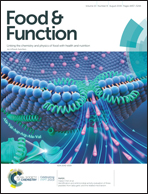Effect of chrysin on changes in intestinal environment and microbiome induced by fructose-feeding in rats†
Abstract
Intake of fructose-containing sugars is epidemiological and experimentally linked to metabolic syndrome (MS). We recently verified that the dietary polyphenol chrysin was able to abolish some of the metabolic changes induced by fructose-feeding in the rat. Because the role of the intestine upon fructose-induced MS is poorly understood, we decided to investigate the influence of fructose, in vivo, on the intestinal environment and the ability of chrysin to interfere with the putative observed changes. For this, adult male Sprague-Dawley rats were treated for 18 weeks as follows: (A) tap water (CONT), (B) tap water and chrysin (100 mg kg−1 day−1) (CHRY), (C) 10% fructose in tap water (FRUCT), and (D) 10% fructose in tap water and chrysin (100 mg kg−1 day−1) (FRUCT + CHRY). Our findings show that the relative expression of SGLT1 and GLUT2 mRNA were not affected by fructose-feeding and/or chrysin. In contrast, GLUT5 mRNA expression was markedly increased in fructose-fed animals, and this effect was reduced by chrysin. However, the apparent permeability to 14C-FRUCT was markedly and similarly decreased in FRUCT, CHRY and FRUCT + CHRY rats. Jejunal villus width and crypt depth were significantly higher in FRUCT and FRUCT + CHRYS rats, respectively. Finally, chrysin did not alter gut microbiota composition, but fructose significantly increased Lactobacillus and E. coli. Moreover, FRUCT + CHRY rats had an increase on the Firmicutes to Bacteroidetes ratio. This is the first report showing that chrysin is able to interfere with the effects of fructose at the intestinal level, which may contribute to the fructose-induced MS features.



 Please wait while we load your content...
Please wait while we load your content...